The financial report of "Crown Hong Renguan" by Yangguang: The demise of Japanese "Midnight Food Store" is an elegy of an aging society.
Shenzhen, China, March 16 (Reporter Xiao Yuan) According to the Voice of China report, with the prosperity of the Internet, the Internet has become the main channel for more and more people to shop, especially some foreign products. Through the Internet, you can "stay at home and buy all over the world". Foreign foods such as rice and milk powder account for a considerable share of cross-border shopping by domestic consumers.
However, are these foreign foods really safe? Recently, the reporter found that a considerable amount of food from Japan’s nuclear radiation area is flowing into China through cross-border e-commerce and overseas purchase. As early as 2011, the competent authorities of our government explicitly prohibited food and agricultural products from ten prefectures in Japan in the nuclear radiation zone from entering our country for sale.
In February this year, China’s Foreign Ministry issued several safety reminders on the nuclear radiation problem in Fukushima, Japan. A spokesperson for the Ministry of Foreign Affairs said that any responsible government will continue to pay close attention to the Fukushima nuclear leak in Japan and its impact on the marine environment, food safety and human health.
"Kalebi" brand cereal from Tochigi Prefecture, Japan is on sale in Taobao, with hundreds of thousands of packages sold every month.
On March 11th, 2011, a major nuclear accident occurred at the Fukushima nuclear power plant in Japan. Since then, the incident has attracted the attention of international public opinion around nuclear pollution and countermeasures. The shadow of "Fukushima sequela" has been hard to disperse. In that year, the General Administration of Quality Supervision, Inspection and Quarantine issued a document that food, edible agricultural products and feed from 10 prefectures and counties such as Fukushima, Tochigi, Niigata and Tokyo in Japan were not allowed to be imported.
However, the reporter’s investigation found that a considerable number of domestic e-commerce platforms sell food suspected of coming from nuclear radiation areas in Japan. Information from Shenzhen Market Inspection Bureau, including JD.COM Mall, Taobao, No.1 Store, Amazon China, Dangdang.com, COFCO Womai.com, Gome Online, Suning.cn, Rainbow Scarf and other e-commerce platforms, all sell a "Kalebi" brand cereal made in Japan, and a considerable part of it comes from Tochigi, which is one of the ten counties where imports are prohibited.
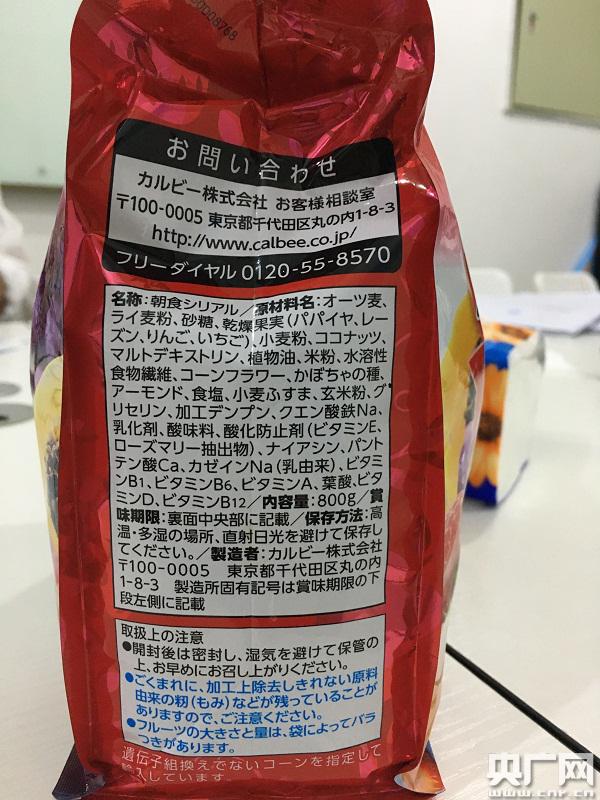
Kalebi cereal, the packaging indicates the origin of Tokyo, and the front production factory of the packaging bag is Tochigi Prefecture.
The salesperson of the Red Scarf Cross-border E-commerce Experience Store said: "The mail came from the bonded area, and it can be mailed to your home. This sale is ok."
The salesperson of the FRESTA cross-border e-commerce experience store said: "It seems that there is no spot on the Internet, it is on Tmall or Taobao, and then it is directly mailed from Japan. Place an order on Tmall and mail it directly to your home. "
As a matter of fact, many merchants are very clear about the state’s explicit prohibition of importing food from Japan’s nuclear radiation zone.
Some merchants told reporters: "This is it. To be honest, I also checked it online, saying that it is owned by Japan and I dare not sell things."
Some merchants also said: "This kind of thing is very sensitive. As you know, there is nuclear radiation in Japan, so what should I do if I don’t allow imported food?" No customs declaration. Some of them came in through the bonded area. "
According to the statistics of Shenzhen Municipal Bureau of Market Inspection, in the past five years, in Shenzhen alone, one million packages of Kalebi cereal were sold through Taobao platform. The Taobao platform has thousands of such cereal sales stores nationwide, with monthly sales of hundreds of thousands of packages.
A manager dealing in imported food from Japan said that only a few businesses in the market do not do this kind of business. "The origin of Kalebi cereal is in the radiation zone, and many people in the market are selling it. The country itself prohibits it, but only a few people are unwilling to sell it. "
After more than half a year’s investigation, the Shenzhen Municipal Market Inspection Bureau recently filed an investigation on Shenzhen Dolphin Cross-border Technology Co., Ltd., a subsidiary of Shenzhen Youshu. According to the person in charge of the company, the company is the largest supply chain platform for importing maternal and child products in China, providing goods for many domestic e-commerce, and is also the largest wholesaler of Kalebi cereal in China at present.
The staff of Shenzhen Market Inspection Bureau said that the data currently available is that more than 200,000 packages have been sold, and there are two main sales methods. One is to sell to downstream wholesalers, such as gathering and some micro-stores. The other is the website of Dolphin Supply Chain, which is sold to some individual consumers. The company has admitted that whether it is sold to secondary wholesalers or individuals, the final products will flow to mainland consumers.
There are many kinds of food sold online in Japan’s nuclear radiation area, including baby milk powder and rice.
Kalebi cereal is just one example of the food suspected of coming from Japan’s nuclear radiation area sold on the e-commerce platform. According to the "Clear Cloud Action" initiated by the Shenzhen Municipal Market Inspection Bureau, there are many kinds of food sold online in Japan’s nuclear radiation area, including rice, beer, beverages, puffed food and even baby milk powder. Then, how did the food banned by these countries get across the layers of supervision and sneak into the country?
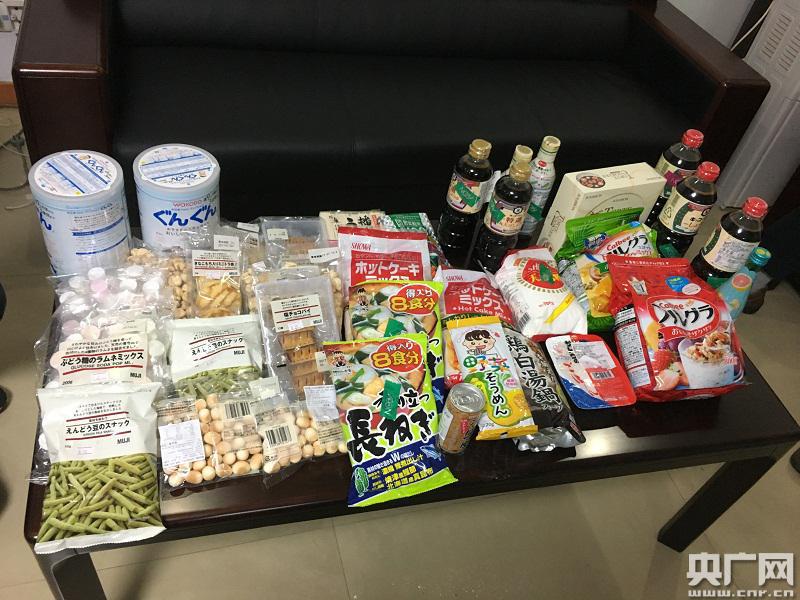
Some of the foods seized by law enforcement agencies are suspected to come from Japan’s nuclear radiation zone, and these can be bought successfully through online shopping in China.
According to the staff of Shenzhen Municipal Market Inspection Bureau, at present, there are many kinds of food suspected of coming from Japan’s nuclear radiation area. "The manufacturer of Heguangtang milk powder is Heguangtang Co., Ltd., and its registered address is in Tochigi Prefecture. Tochigi Prefecture is one of the ten areas where imports are prohibited. White rice is also marked on it, which is produced in Hokkaido. However, tearing the Chinese label can be seen that the manufacturer is Sato Food Co., Ltd., and the address is in Baomachi, the eastern district of Niigata City. "
And this phenomenon is also spreading from online to offline.
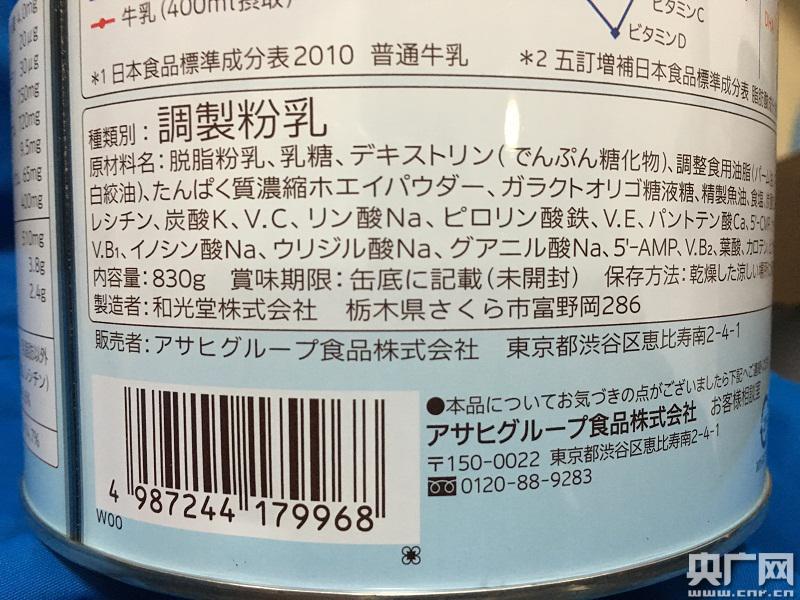
Heguangtang infant milk powder, the manufacturer’s address is Tochigi, Japan.
Muji’s food counter, Japanese label shows that the place of origin is Tokyo. The salesperson said that he had not heard of any nuclear radiation area.
Shenzhen AEON Supermarket also has a large number of foods suspected to come from nuclear radiation areas. Law enforcement officers of Shenzhen Municipal Market Inspection Bureau said that all their products have Chinese labels. However, there is a phenomenon that if the registered address of the manufacturer is within ten counties, their information will be covered by Chinese labels.
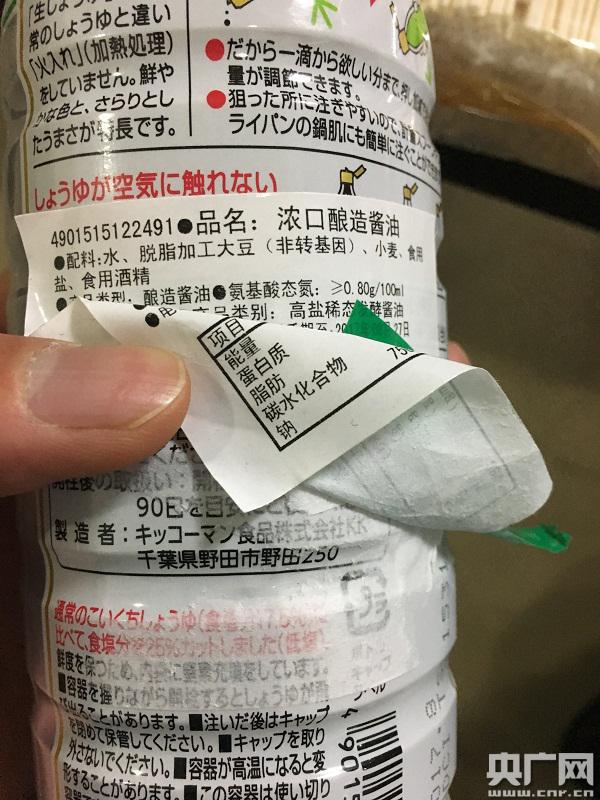
Soy sauce made in Japan, with Chinese label torn off, is produced in Chiba Prefecture.
Cross-border e-commerce is the main inflow route, and bonded warehouses do not need quarantine inspection.
Since the country has explicitly banned imports, how can these foods from Japan’s nuclear radiation zone flow into the domestic market? A staff member of the physical store of Global Tesco Company admitted frankly that she had heard that food in some parts of Japan could not be sold, but the company said there was no problem. "We are also afraid, and we can’t say that it will cause any harm when the time comes. Therefore, we also asked the company, and the company said that it passed the customs normally. If it really can’t pass, the customs will definitely not let it pass. "
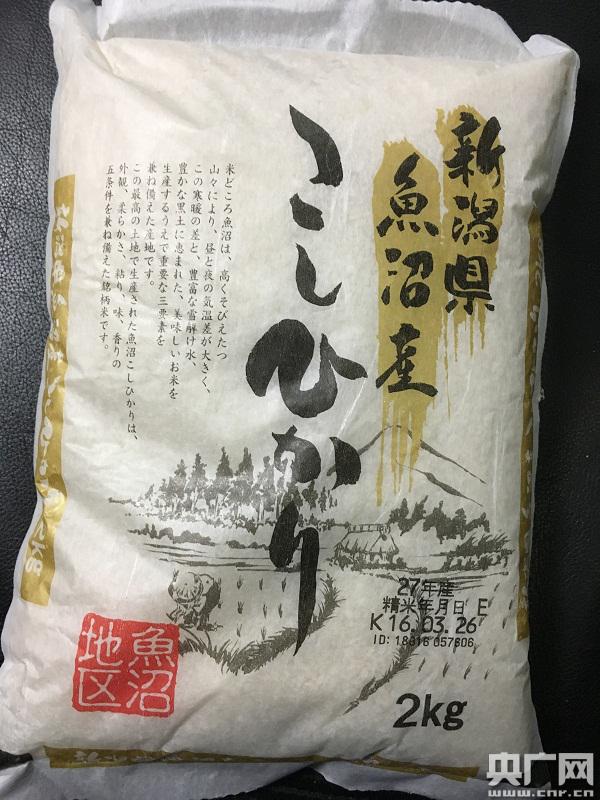
Rice production in Niigata Yuzhao area
A person in charge of Shenzhen Classic Renyuan Trading Co., Ltd. said that transit in Hong Kong is one of the channels. "This kind of thing is very sensitive, Japan’s nuclear radiation, don’t let imported food, how to do? No customs declaration. Some of them have no choice but to go to Hong Kong and then to Shenzhen without going through the customs. The quantity in Hong Kong is still quite large. "
The person in charge of Shenzhen Dolphin Cross-border Technology Co., Ltd. said that the company came in through the bonded area. Cross-border e-commerce first enters the domestic bonded area in large quantities, but has not yet paid taxes, and then pays taxes when the customer places an order and the package goes out. The company has bonded warehouses in Tianjin, Shenzhen Qianhai and Hangzhou.
Law enforcement officers of Shenzhen Municipal Market Inspection Bureau said that according to their investigation, cross-border e-commerce is the main way for food in these nuclear radiation areas to flow into China. Mainly through the bonded warehouse sales and overseas direct mail in two forms. At present, the policy is that when products enter bonded warehouses, they do not need to go through inspection and quarantine, and are basically in the blank supervision scope. In this way, when the products are resold to consumers, they are not inspected and quarantined by the national inspection and quarantine department for food safety.
At present, the Shenzhen Municipal Market Inspection Bureau has formally initiated an investigation into more than 100 business entities suspected of selling food from Japan’s nuclear radiation zone.